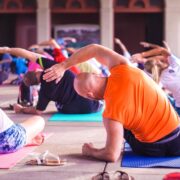
Eating and exercise: 5 tips to maximize your workouts
Fitness and exercise play a crucial role in maintaining overall health and well-being. Regular physical activity has been linked to numerous benefits, including improved cardiovascular health, increased strength and endurance, weight management, and reduced risk of chronic diseases such as diabetes and heart disease. In order to maximize the benefits of exercise, it is important to fuel your body with the right foods, incorporate both cardio and strength training into your routine, stay hydrated, prioritize rest and recovery, set realistic goals and track progress, maintain consistency and discipline, use proper form and technique to prevent injury, incorporate variety and challenge into your workouts, partner with a fitness professional or accountability partner, and maintain a healthy balance between exercise and nutrition.
Key Takeaways
- Fueling your body with the right foods before a workout is crucial for optimal performance.
- Incorporating both cardio and strength training can lead to the best results.
- Hydrating during and after exercise is important for maintaining energy and preventing dehydration.
- Rest and recovery are essential for maximizing the benefits of your workouts.
- Setting realistic goals and tracking progress can help you stay motivated and on track.
The Importance of Fueling Your Body with the Right Foods Before a Workout
Food is the fuel that powers our bodies, and what you eat before a workout can have a significant impact on your performance. Eating the right foods before exercise can provide you with the energy you need to power through your workout, improve endurance, enhance muscle recovery, and prevent muscle breakdown. It is important to consume a balanced meal or snack that includes carbohydrates for energy, protein for muscle repair and growth, and healthy fats for sustained energy.
Some examples of pre-workout meals or snacks include a banana with almond butter, Greek yogurt with berries and granola, whole grain toast with avocado and eggs, or a protein smoothie with spinach, berries, and almond milk. Experiment with different options to find what works best for you and your body.
How to Incorporate Cardio and Strength Training for Optimal Results
Both cardio and strength training are important components of a well-rounded fitness routine. Cardiovascular exercise helps improve heart health, burn calories, increase endurance, and reduce the risk of chronic diseases. Strength training helps build lean muscle mass, increase metabolism, improve bone density, enhance overall strength and stability, and prevent age-related muscle loss.
To incorporate both types of exercise into your routine, aim for a combination of cardio and strength training workouts throughout the week. This could include activities such as running, cycling, swimming, or dancing for cardio, and weightlifting, bodyweight exercises, or resistance training for strength. It is important to listen to your body and give yourself adequate rest and recovery between workouts to prevent overtraining and injury.
The Benefits of Hydrating During and After Exercise
Hydration is essential for optimal exercise performance and overall health. When you exercise, your body loses water through sweat, and it is important to replenish those fluids to prevent dehydration. Staying hydrated during exercise helps regulate body temperature, lubricate joints, deliver nutrients to cells, and remove waste products from the body.
To stay hydrated before, during, and after your workout, it is recommended to drink water regularly throughout the day, especially leading up to your workout. During exercise, aim to drink water every 15-20 minutes or as needed. After your workout, continue to hydrate by drinking water or consuming a sports drink that contains electrolytes to replenish lost fluids and minerals.
The Role of Rest and Recovery in Maximizing Your Workouts
Rest and recovery are often overlooked but are crucial components of any fitness routine. When you exercise, you are essentially breaking down muscle tissue. It is during rest and recovery that your body repairs and rebuilds that tissue, leading to muscle growth and improved performance.
Incorporating rest days into your routine allows your muscles time to recover and adapt to the stress of exercise. It is important to listen to your body and give yourself adequate rest between workouts. This could include taking a day off from exercise completely or engaging in low-intensity activities such as yoga or stretching.
How to Set Realistic Goals and Track Your Progress
Setting realistic goals and tracking your progress is essential for staying motivated and seeing results. When setting goals, it is important to make them specific, measurable, attainable, relevant, and time-bound (SMART). This means setting goals that are specific to your needs and desires, measurable so you can track progress, attainable so they are within reach, relevant to your overall fitness journey, and time-bound with a specific deadline.
Tracking your progress can be done in various ways, such as keeping a workout journal, using a fitness app or wearable device, taking progress photos, or measuring body composition. By tracking your progress, you can see how far you’ve come and make adjustments to your routine as needed.
The Impact of Consistency and Discipline on Your Fitness Journey
Consistency and discipline are key factors in achieving fitness goals. It is important to establish a routine and stick to it, even when motivation is low or life gets busy. Consistency allows your body to adapt to the stress of exercise and see long-term results.
Discipline is also important in maintaining healthy habits and making choices that align with your goals. This could include making time for exercise, prioritizing healthy eating, getting enough sleep, and managing stress. By staying consistent and disciplined in your routine, you will be more likely to achieve your fitness goals.
The Importance of Proper Form and Technique to Prevent Injury
Proper form and technique are essential for preventing injury during exercise. When performing exercises, it is important to maintain proper alignment, engage the correct muscles, and use controlled movements. Poor form can lead to muscle imbalances, joint pain, and increased risk of injury.
To maintain proper form and technique during exercise, it is helpful to start with lighter weights or resistance and focus on mastering the movement before progressing to heavier weights or more advanced exercises. It can also be beneficial to work with a fitness professional who can provide guidance and correct any form errors.
How to Incorporate Variety and Challenge into Your Workouts
Incorporating variety and challenge into your workouts is important for preventing boredom, avoiding plateaus, and continuously challenging your body. By changing up your routine, you can target different muscle groups, improve overall fitness, and keep your workouts interesting.
Some ways to incorporate variety and challenge into your workouts include trying new exercises or activities, varying the intensity or duration of your workouts, incorporating interval training or circuit training, using different equipment or workout tools, or participating in group fitness classes. By keeping your workouts fresh and challenging, you will be more likely to stay motivated and see continued progress.
The Benefits of Partnering with a Fitness Professional or Accountability Partner
Partnering with a fitness professional or accountability partner can greatly enhance your fitness journey. A fitness professional can provide guidance, expertise, and personalized workout plans to help you reach your goals. They can also ensure that you are using proper form and technique to prevent injury.
An accountability partner can provide support, motivation, and encouragement throughout your fitness journey. They can help keep you on track, hold you accountable to your goals, and provide a sense of camaraderie. Whether it’s a friend, family member, or coworker, having someone to share your fitness journey with can make it more enjoyable and successful.
How to Maintain a Healthy Balance between Exercise and Nutrition for Long-Term Success
Maintaining a healthy balance between exercise and nutrition is essential for long-term success. While exercise is important for overall health and fitness, it is only one piece of the puzzle. Proper nutrition is equally important for fueling your body, supporting recovery, and achieving optimal results.
To maintain a healthy balance between exercise and nutrition, it is important to focus on consuming a well-rounded diet that includes a variety of fruits, vegetables, lean proteins, whole grains, and healthy fats. It is also important to listen to your body’s hunger and fullness cues, eat mindfully, and avoid restrictive diets or extreme calorie deficits. By nourishing your body with the right foods, you will have the energy and nutrients needed to support your workouts and achieve long-term success.
In conclusion, fitness and exercise are vital for overall health and well-being. By fueling your body with the right foods, incorporating both cardio and strength training, staying hydrated, prioritizing rest and recovery, setting realistic goals and tracking progress, maintaining consistency and discipline, using proper form and technique, incorporating variety and challenge, partnering with a fitness professional or accountability partner, and maintaining a healthy balance between exercise and nutrition, you can maximize your workouts and achieve your fitness goals. Remember to listen to your body, be patient with yourself, and enjoy the journey.
If you’re looking for more tips and tricks to enhance your workouts, be sure to check out this insightful article from Wave Magnets. They provide valuable insights on how to optimize your eating and exercise routine to maximize your fitness goals. From pre-workout nutrition to post-workout recovery, this article covers it all. Don’t miss out on the opportunity to take your workouts to the next level. Read the full article here.
FAQs
What is the relationship between eating and exercise?
Eating and exercise are closely related as the food we consume provides the energy needed for physical activity. Proper nutrition can help maximize the benefits of exercise and improve overall health.
What are some tips for eating before a workout?
It is recommended to eat a meal containing carbohydrates and protein 2-3 hours before a workout. If you don’t have time for a full meal, a small snack containing carbohydrates can provide the necessary energy. Avoid high-fat and high-fiber foods before exercise.
What should I eat after a workout?
After a workout, it is important to consume protein and carbohydrates to help repair and rebuild muscles. A protein shake, Greek yogurt, or a turkey sandwich on whole wheat bread are good options.
How much water should I drink during exercise?
It is recommended to drink 17-20 ounces of water 2-3 hours before exercise and then continue to drink 7-10 ounces every 10-20 minutes during exercise. The amount of water needed may vary depending on the intensity and duration of the workout.
What are some good sources of carbohydrates for energy?
Good sources of carbohydrates for energy include whole grains, fruits, vegetables, and low-fat dairy products. It is important to choose complex carbohydrates that provide sustained energy rather than simple sugars that can cause a quick spike and crash in blood sugar levels.


















